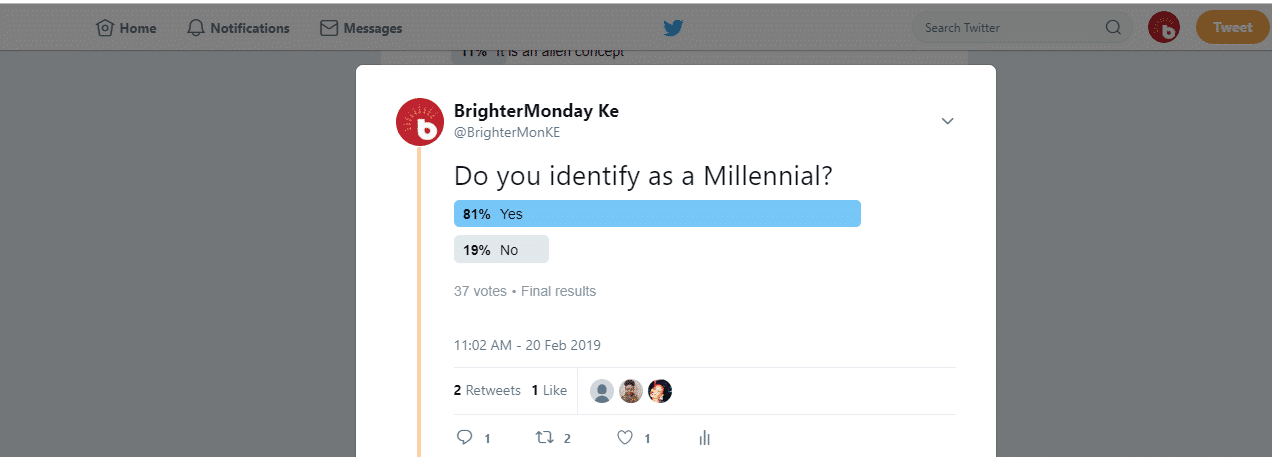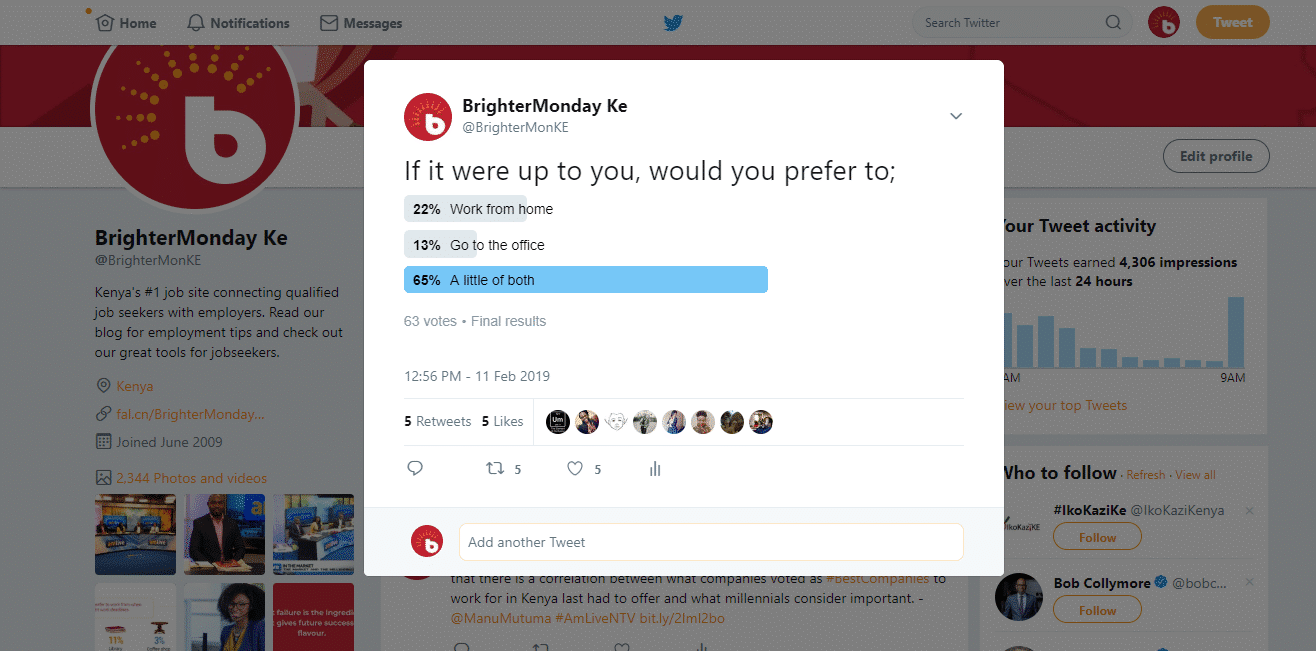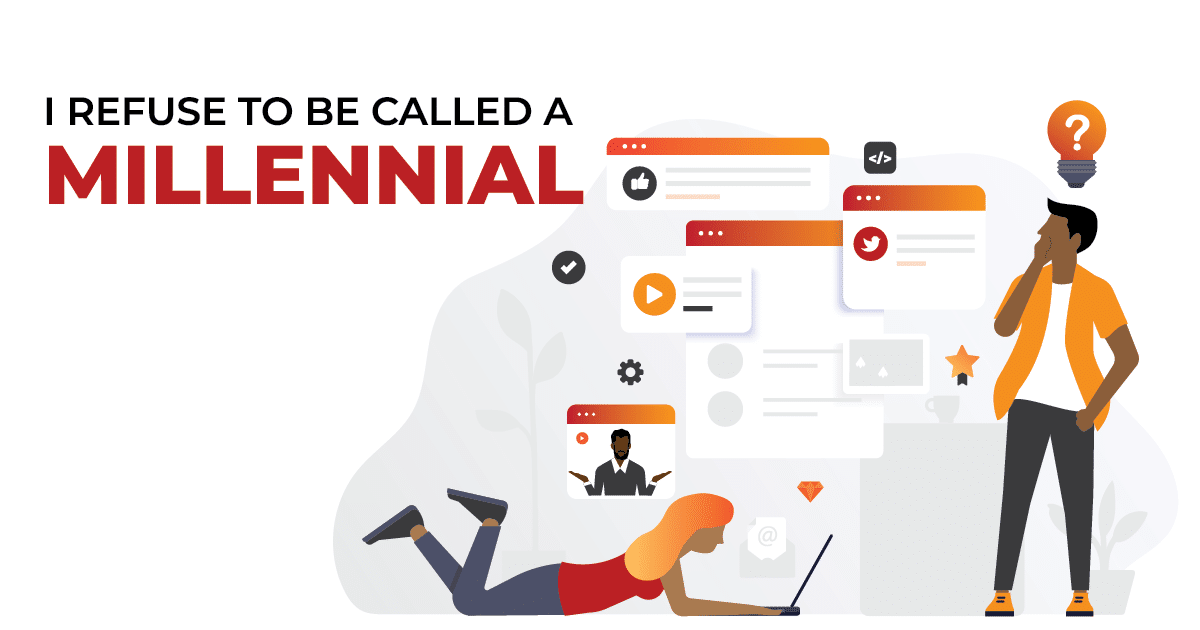Research identifies a millennial as anyone born between the years 1981-2000. This means anyone between the ages 19-38. This group of people are mostly identified as the new technology era kids who grew up with mobile phones and the internet. However, while most people in the younger extreme of this age bracket feel aptly identified as millennials, most of the older members of the age bracket feel misidentified.
A quick poll on twitter reveals that there are those between this age bracket that do not identify as millennials.

…And some of the reasons given as to why they do not identify as millennials are;

The recent BrighterMonday Millennials Report conducted on over 8000 young urban employees has statistics on the age of the respondents as shown below.

Given the huge difference in age between the youngest and oldest millennial, it is no surprise that this group might not be a one size fits all. Let’s explore the reasons why.
Different Ages Experienced Different Levels of Technology
A quick search on Google for the word millennial and this is the kind of images you will find;

Young people with a phone or a tablet completely in their zones ‘connecting’ with other people. Millennials 26 years and below completely relate to the above image. They were born at a time when phones and the internet were mainstream. For this millennial, their whole life can run online. If they want to buy something, they will look for an online store. If they can find it online why hustle going to a physical store?
Millennials born in the late 80’s and early 90’s, however, may not completely find the image above as definitive of them. Many people in this age bracket feel like they are not part of (in their view) highly sensationalized millennial generation. While they are highly versed in technology and all that comes with it, they don’t feel like it controls their lives as it apparently does the younger members of the group.
A Tale of Different Ideals and Somewhat Different Traits
Apart from personal factors like personalities, personal values, different economic and social backgrounds, the period one was born and the surrounding environment contributes to how they view the world. Millennials grew up in an online and socially-networked world and hey have received the highest levels of marketing attention.
They tend to be extremely optimistic because they grew up with the ever-present “helicopter parents” who kept telling them to “follow their dreams” and that they were special. Thus their confidence levels are unusually high as sometimes rub off as overconfident, arrogant and with a sense of entitlement to the other generations. A report states that these aspects and traits result in the millennial entering adulthood with unrealistic expectations and it mostly leads to disillusionment. It contributes to some of their unappealing traits in the workplace like impatience, lack of depth, job-hopping and a seemingly poor work ethic.
It is some of these traits that the older millennials feel don’t define them. The older millennials see themselves as more grounded and realistic when it comes to their perception of life and things that matter. They take time to think things through and have a better work ethic in the workplace.
Traits that Both Young and Older Millennials Share
Despite the fact that older millennials may at most times want to disassociate with the term millennials, there is no denying that there are certain traits that cut across the whole generation. This includes;
Tech-Savvy Nature of Millennials
The BrighterMonday report revealed that tools and technology are an important resource in the workplace.

Software and up-to-date technology are important components for all millennials in the workplace as they value high levels of efficiency and use of appropriate tools to make work easier.
Millennials are Team-Oriented
Millennials value team work and collaboration to attain goals and objectives set. Unlike the previous generations, millennials find more reward in collaborations and making the workplace a sports field rather than a battle field. The BrighterMonday Millennial Report revealed that millennials prefer collaboration over competition.

Millennials are Family-Centric
Millennials value personal time and consider jobs that give them more flexibility as more appealing. Flexibility for millennials means more time to incorporate other important facets of life like family, personal interest and hobbies. The BrighterMonday report showed that employees require family support from employers and that it influences their performance and productivity.

Given the above pointers, do you consider yourself an older, younger or no millennial at all? Tell us in the comments.
Powerful Tips of Communicating Better with Millennials
Creating a fun, laid-back working environment has been touted as one way of attracting and retaining millennials. But beyond a fancy office with a pool table and a lounge, there is more to keeping millennials engaged, and this is mainly based on how you engage this demographic. As employers across the country are now realizing, millennials are not just comfortable with clocking in and out and getting the job done, they want to be a meaningful part of the organization and they are demanding for more than just a fancy working environment.
Granted, the difference in their work ethic, communication styles, and preferred working styles seem complicated to those from previous generations. However, research indicates that millennials are just as ambitious, hardworking, talented, and eager, as previous generations. The only difference is that millennials have a different way of working, which many employers are struggling to understand.
The best way to engage this demographic is to, therefore, communicate with them genuinely and actively, to gain a deeper understanding of what works with them and what doesn’t. Here are tips on how to communicate better with millennials and build strong working relationships.
- Embrace the Use of Technology

Face-to-face communication and endless meetings were often the most trusted forms of communication in the past. This was only substituted by emails and official communication channels. However, millennials are ditching these forms of communication for something faster and more interactive. Anything that can be said without writing a long email or holding a 2-hour meeting will be said without the two.
The rise of social media and chat channels has further made this easy, as communication can now happen on the go. Therefore, millennials appreciate the use of modern communication channels as has been made possible by the rise in technology. Channels such as Slack and Skype are a common feature in many workplaces, as they ease communication and help people collaborate without carving out time for meetings.
According to millennials, emails should only be used where it is absolutely necessary and meetings should only be held where they are the best option. Anything else can and should be said through other channels. On the other hand, the rise of modern communication channels has made it possible for millennials to communicate on the go. This means that employers must embrace open communication channels which facilitate this kind of communication, to keep millennials engaged and facilitate collaboration.
2. Avoid Jokes About Age and Experience
Condescending and insensitive jokes about age demonstrate that one does not appreciate the value that millennials bring on board. Saying things like “I was doing this before you were born”, or “You are too young to understand this” just does not sit well with millennials. The changes in technology are an indication that it is not business as usual and interestingly, the millennials own the technologies now being used at the workplace. The application of these technologies is the difference between success and failure. Therefore, bringing age into an argument indicates that you do not appreciate the skills that they possess and which are valuable to the organization. Millennials will easily leave if they don’t feel valued and respected, which makes employers lose out on their skills and expertise.
3. Get them Actively Involved

There are many things happening around millennials, facilitated by the numerous communication channels around them and other sources of information. Their attention is, therefore, highly segmented. One way of getting their attention is to get them to be actively involved in what you are doing. This enables them to also voice their ideas and opinions.
Millennials are not comfortable with just being told what they should do. They want to take an active role in the decision-making process and to have their ideas being taken into account. They are not comfortable with being passive at the workplace and having open communication channels does the trick as they get to voice their opinions. This also encourages them to be creative, which boosts their productivity.
4. Be Brief and Meaningful
Millennials represent a demographic that can communicate in 280 characters and make perfect sense. The vast majority of Kenyan cultures have communication styles that are lengthy, indirect, and in some cases unnecessary. With millennials being used to communicating on the go and saying what needs to be said in a few words, it is no wonder that they find lengthy meetings and emails boring. This is backed up by science which shows that people’s attention spans are getting shorter.
If you want millennials to pay attention, learn how to communicate quickly and effectively. Make use of technology to assist you and always strive to get straight to the point. Long, winding tales will dilute the communication and this will affect how your message is received and translated. The more concise your message, the easier will it be for it to be received and acted upon accurately.
5. Be Honest

If you ask a millennial a question, what you are likely to get is an honest and straightforward answer. In some instances, the person is likely to be so honest that the answer will not be comfortable. But they have mastered the art of getting straight to the point, which is an aspect of being brief in communication. This does not sit well with people used to long, diplomatic and often dodgy communication styles.
This is based on the need to build trust with the people they relate with and they thus, do not appreciate sugar-coated messages. In return, they also expect honest communication, which helps them in improving their productivity. On the other hand, always encourage them to provide feedback and pay attention to this feedback when it is provided.
Millennials are doing away with the old and charting their own paths. The old rules no longer apply to this disruptive generation and it is in every company’s best interest to pay attention. Notably, this demographic brings on board valuable skills which can catapult your organization to the next level. So you better pay attention to their needs and this can only happen by communicating better.
Why Millennials Want Flexibility At Work
Millennials have over time been considered as a tech-savvy generation with advanced and diverse approaches to the work space. The BrighterMonday survey report shows that 63.3% of millennials prefer a flexible work schedule which fits their needs and improves productivity.

A quick poll on the BrighterMonday Twitter account revealed that most young people in the workplace desire flexibility of working both in the office and remotely. They would like to have a bit of both worlds. The following reasons explain why millennials want flexibility at work and its importance.
Flexibility Compliments Work-Life Balance

Having the ability to balance work and family life or other fun activities makes flexibility a desirable trait in a company when looking at employer options. More employees want to be identified for the input they have in their work space while still being available for their friends and families. A company must know why millennials want flexibility at work and how it impacts on its growth. Companies that allow their employees flexibility have more engaged and loyal employees.
Flexibility Promotes Advancing of Skills
Most people in the workplace wish to advance their careers over time. Millennials, in specific, consider opportunities for career advancement as a requirement when considering a job offer. Career advancement opportunities require a good measure of flexibility. It involves spending time retaining, learning a new skill, going for workshops and seminars etc. Incorporating their personal development initiatives while still hitting business targets for employers motivates this group to be more productive and ambitious, a quality desirable to most employers.
Flexibility is Supported by Technology

The ability to access and use certain aspects of technology has made the concept of flexibility real and natural. Different tools are now used for communication, project tracking and team collaboration to ensure that teams are in sync on important aspects of a project despite their varied geographical locations. Millennials are not only tech-savvy, but tech dependent too. Their uptake for upcoming technological trends is driven by their desire to make processes and life easier. Hence the rationalization of flexibility in the workplace.
Flexibility Simplifies Work Demands

Most employees in the workplace know when they are most productive. There are those who are early birds and prefer to knock out most of their targets early in the morning because their brains take a trip in the afternoons. Then there are those whose brains ‘wake up’ after 10 o’clock tea and work best into the evening. Imagine a world where everyone worked when they’re most productive. This of course depends on the nature of one’s role. Flexibility in the workplace coupled with great technology allows for early birds to rise up and get things done even before getting to the office and night owls to get their tasks done before settling in the previous night. This kind of flexibility not only allows the millennial to work when they’re most productive, but to incorporate other parts of their lives too.
As workplace dynamics change, flexibility will make more sense and become more natural. With the giant leaps in technology being experienced, the influx of more international companies with different work cultures, things are bound to change in the Kenyan workspace don’t you think?





